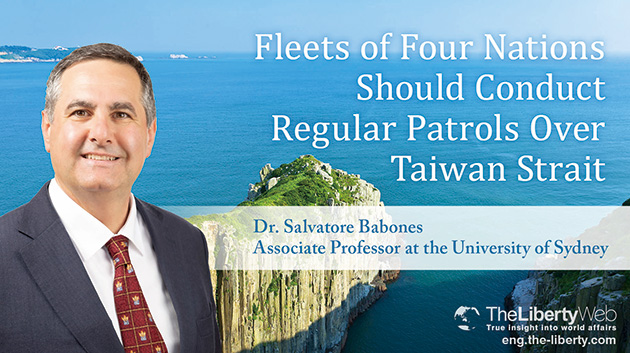Fleets of Four Nations Should Conduct Regular Patrols Over Taiwan Strait
An Australian expert spoke with The Liberty to discuss the hidden potential of the Quad alliance of the U.S., Japan, India and Australia.

Dr. Salvatore Babones is an associate professor at the University of Sydney. He earned his Ph.D. in sociology from the Johns Hopkins University. Prior to joining the University of Sydney in 2008, he taught sociology at the University of Pittsburgh. He is a columnist for Foreign Policy and a regular contributor to The Australian etc.
— Do you think Quad will fulfill its role in countering Chinese hegemony and expansionism?
Dr. Salvatore Babones: The Quad has a great potential as a security alliance. The only really rational basis for the Quad is to have a format for continuous maritime cooperation, not just once a year, but to jointly patrol. For example, the United States sometimes does a Freedom of Navigation Operation in the Taiwan Straits. Right now, there’s a British ship that is doing the operation with U.S. ships, but it’s not a continuous multinational effort. If the Quad were to work as an ongoing security mechanism, then they could regularly patrol the Taiwan Strait using all four countries’ ships to do it. It would start to create an Asian security infrastructure that people like to call an Asian NATO.
NATO used to be a functioning military alliance in the 1950s and 1960s. It’s not what NATO is today. It’s become more of an organization for training, for patrolling, for constant cooperation. Whereas NATO is primarily a land organization, an Asian version would be primarily a maritime organization. So I think it’s very possible.
But there’s no possibility that Australia, Japan and India will cooperate without the U.S. anchoring the grouping. Japan, for historical reasons, can’t be the lead of an Asian alliance because there are still memories of World War II. There was talk just before Trump left office of a U.S. First Fleet potentially being based in Darwin. That would’ve been a multinational fleet which would include units from India, Australia, Japan and the U.S. in permanent cooperation. But in fact, Biden’s appointed a secretary of state who’s very focused on Europe. He’s appointed a national security adviser who’s very focused on the Middle East. I don’t think he sees Asia as the main theater of American attention. In that case, the Quad wouldn’t be very effective.
— While the Quad alliance is becoming more connected, Southeast Asian countries are leaning toward China.
Dr. Babones: I think the Chinese influence in Southeast Asia has really reached a high tide and is now receding. Back before 2017, there was always money available for construction projects, but once growth slowed down, most of that project money failed to materialize. All across Southeast Asia, China’s promises of belt and road construction projects have essentially been unfulfilled.
China has a typical middle-income country kind of level of development, with an economic structure similar to that of Turkey or Mexico. Today, China’s GDP per capita is still lower than Mexico’s. It is a highly corrupt economy with a high level of state management and interference in the economy. There are very high levels of state investment and state-owned enterprises as a percentage of the total economy.
China’s official statistics report 6 to 6.5 percent growth, but a substantial part of that growth is nonproductive growth. So if China produces an extra 100 million tons of steel that are unnecessary for the economy, technically that’s still GDP growth. But that’s not in any sense productive or leading to future productivity. So China’s productivity growth rate, I think, has stalled to virtually nothing.
China, after making big promises, is now demanding that Southeast Asian countries pay more for these projects and as a result, China’s influence is in retreat.
— What are your thoughts on human abuse in Tibet, Hong Kong and of Uighurs in Xinjiang region?
Dr. Babones: I used to travel to China two or three times a year. But after my last trip to China in 2018, I decided I’m not going to do tourism in China anymore. And those are sort of moral decisions we should be putting in front of people, that individual people and companies have to make these decisions. And the government should promote those decisions.
Certainly, universities should not be cooperating with Chinese universities and having educational exchange with Chinese institutions. We should certainly prohibit the export of high-technology materials and intellectual property to China. We should not let Chinese companies raise money outside the country. I would say all Chinese companies, not just state-linked or military-linked, should simply be banned from international capital markets. We should be sending a strong message that it’s immoral to cooperate with the Chinese regime.
— You also reported in your article the importance of preventing Russia and China from becoming closer.
Dr. Babones: I think the country that’s closest to Russia in all of this is India. The Biden administration is so vehemently anti-Russia that it’s hard for them to see the value in giving Russia the opportunity to reorient itself to Europe, such as India buying weapons from Russia. But India’s partnership with Russia is preventing Russia from cooperating with China.
For four years, the Democrats accused Donald Trump of being a puppet of Vladimir Putin. Now they have to be as extreme anti-Putin as possible. And that’s very unfortunate.



















